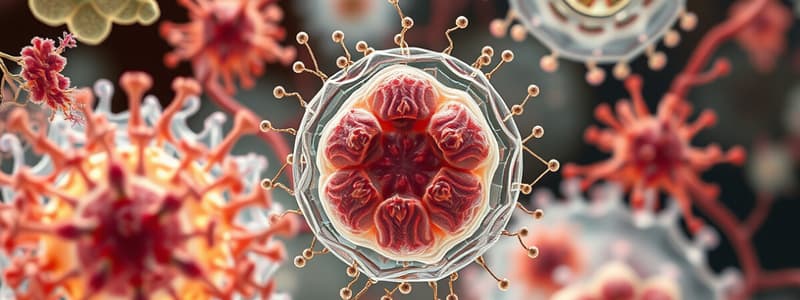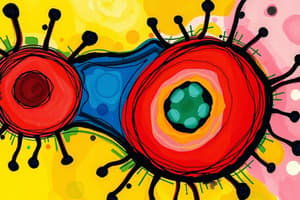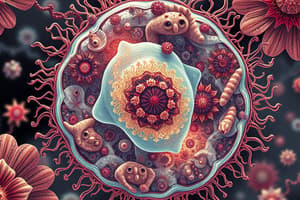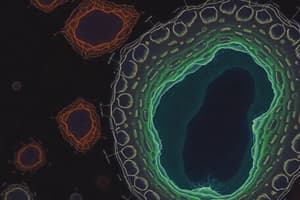Podcast
Questions and Answers
Which type of cell lacks a nucleus?
Which type of cell lacks a nucleus?
- Plant cells
- Prokaryotic cells (correct)
- Animal cells
- Eukaryotic cells
What is the primary function of mitochondria?
What is the primary function of mitochondria?
- Lipid synthesis
- ATP production (correct)
- Photosynthesis
- Protein synthesis
Which cellular process results in the formation of gametes?
Which cellular process results in the formation of gametes?
- Meiosis (correct)
- Fission
- Cytokinesis
- Mitosis
Which of the following organelles is involved in lipid synthesis?
Which of the following organelles is involved in lipid synthesis?
What type of transport requires energy to move substances against their gradient?
What type of transport requires energy to move substances against their gradient?
What is the role of lysosomes in the cell?
What is the role of lysosomes in the cell?
Which process is primarily involved in building larger molecules from smaller ones?
Which process is primarily involved in building larger molecules from smaller ones?
The semi-permeable barrier that regulates the passage of substances in and out of the cell is known as the:
The semi-permeable barrier that regulates the passage of substances in and out of the cell is known as the:
Flashcards are hidden until you start studying
Study Notes
Cell Biology Study Notes
1. Basic Unit of Life
- All living organisms are composed of cells.
- Cells are the smallest units capable of performing life functions.
2. Types of Cells
-
Prokaryotic Cells:
- Lack a nucleus and membrane-bound organelles.
- Examples: Bacteria and Archaea.
-
Eukaryotic Cells:
- Contain a nucleus and membrane-bound organelles.
- Examples: Plant cells, animal cells, fungi, and protists.
3. Cell Structure
-
Cell Membrane:
- Semi-permeable barrier that regulates the passage of substances in and out of the cell.
-
Nucleus:
- Contains genetic material (DNA).
- Surrounded by the nuclear envelope.
-
Cytoplasm:
- Gel-like substance where organelles are suspended.
-
Organelles:
- Mitochondria: Powerhouse of the cell; site of ATP production.
- Ribosomes: Synthesizes proteins; found free in the cytoplasm or attached to the rough endoplasmic reticulum (RER).
- Endoplasmic Reticulum (ER):
- Rough ER: Studded with ribosomes; involved in protein synthesis and processing.
- Smooth ER: Lacks ribosomes; involved in lipid synthesis and detoxification.
- Golgi Apparatus: Modifies, sorts, and packages proteins and lipids for secretion or delivery to other organelles.
- Lysosomes: Contains enzymes for digestion of waste materials and cellular debris.
- Chloroplasts (in plant cells): Site of photosynthesis, contains chlorophyll.
4. Cell Division
-
Mitosis:
- Process of somatic cell division resulting in two identical daughter cells.
- Stages: Prophase, Metaphase, Anaphase, Telophase, and Cytokinesis.
-
Meiosis:
- Process of gamete formation; reduces chromosome number by half.
- Involves two rounds of division: Meiosis I and Meiosis II.
5. Cellular Metabolism
-
Anabolism:
- Constructive processes; builds large molecules from smaller ones (e.g., protein synthesis).
-
Catabolism:
- Breakdown of molecules to release energy (e.g., cellular respiration).
6. Transport Mechanisms
-
Passive Transport:
- Movement of molecules across the cell membrane without energy input (e.g., diffusion, osmosis).
-
Active Transport:
- Requires energy to move substances against their concentration gradient (e.g., sodium-potassium pump).
7. Cell Communication
-
Signal Transduction:
- Process by which cells respond to external signals (e.g., hormones, neurotransmitters).
-
Receptors:
- Proteins on cell membranes that bind to signaling molecules and initiate a cellular response.
8. Cellular Specialization
- Cells differentiate to perform specific functions (e.g., muscle cells, nerve cells).
- In multicellular organisms, specialized cells work together to form tissues and organs.
9. Cell Theory
- All living things are composed of cells.
- The cell is the basic unit of life.
- All cells arise from pre-existing cells.
Basic Unit of Life
- Living organisms consist entirely of cells.
- Cells are the fundamental units that execute essential biological functions.
Types of Cells
- Prokaryotic Cells:
- Lack a nucleus and membrane-bound organelles.
- Examples include Bacteria and Archaea.
- Eukaryotic Cells:
- Possess a nucleus and membrane-bound organelles.
- Examples include plant cells, animal cells, fungi, and protists.
Cell Structure
- Cell Membrane:
- Functions as a semi-permeable barrier, controlling substance entry and exit.
- Nucleus:
- Stores genetic material (DNA) and is encased by the nuclear envelope.
- Cytoplasm:
- Gel-like medium where organelles are suspended and chemical reactions occur.
- Organelles:
- Mitochondria: The cell's power generators, producing ATP through respiration.
- Ribosomes: Sites for protein synthesis, either floating freely or attached to the rough ER.
- Endoplasmic Reticulum (ER):
- Rough ER: Contains ribosomes; key in protein synthesis and processing.
- Smooth ER: Lacks ribosomes; involved in lipid synthesis and detoxification.
- Golgi Apparatus: Modifies, sorts, and packages proteins and lipids for distribution.
- Lysosomes: Digestive organelles containing enzymes that break down waste materials.
- Chloroplasts (in plant cells): The site of photosynthesis and responsible for chlorophyll production.
Cell Division
- Mitosis:
- Somatic cell division yielding two genetically identical daughter cells.
- Stages include Prophase, Metaphase, Anaphase, Telophase, and Cytokinesis.
- Meiosis:
- Gamete formation process which halves the chromosome number.
- Consists of two rounds of division: Meiosis I and Meiosis II.
Cellular Metabolism
- Anabolism:
- Constructive metabolic processes creating larger molecules from smaller ones (e.g., protein synthesis).
- Catabolism:
- Metabolic breakdown of molecules releasing energy (e.g., cellular respiration).
Transport Mechanisms
- Passive Transport:
- Movement of molecules across the cell membrane without energy use (e.g., diffusion, osmosis).
- Active Transport:
- Energy-dependent process moving substances against their concentration gradient (e.g., sodium-potassium pump).
Cell Communication
- Signal Transduction:
- The mechanism by which cells react to external signals such as hormones and neurotransmitters.
- Receptors:
- Membrane proteins that bind signaling molecules and trigger a cellular response.
Cellular Specialization
- Differential cell development allows distinct functions (e.g., muscle vs. nerve cells).
- In multicellular organisms, specialized cells collaborate to form tissues and organs.
Cell Theory
- All living organisms are made of cells.
- Cells are the fundamental unit of life.
- New cells arise only from existing cells.
Studying That Suits You
Use AI to generate personalized quizzes and flashcards to suit your learning preferences.




